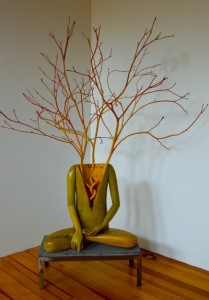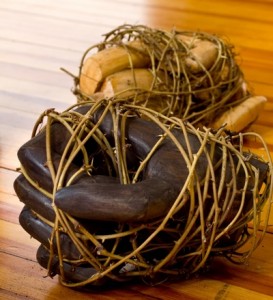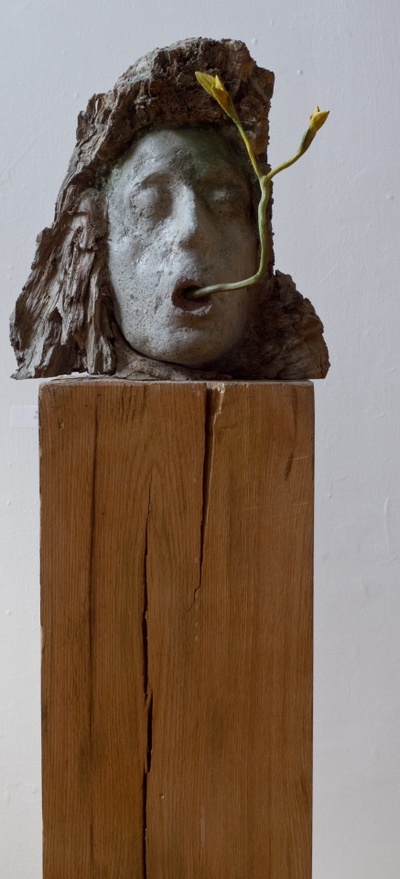
Some thoughts on Ana Flores’s Earth History, Selected Sculptures 1997-2013
July 3, 2013
By Patricia Rosoff, Art New England Online
Some thoughts on Ana Flores’s Earth History, Selected Sculptures 1997-2013
[Part of Poetry of the Wild recently installed on the Sculpture Walk at the Alexey von Schlippe Gallery of Art, UConn at Avery Point, Groton CT]

Two currents move through the work of Ana Flores as encountered, recently installed both at the Alexey von Schlippe Gallery and along the windswept Sculpture Walk by the Sea. One is private and figurative, expressed in lyric attentiveness to details of relation, to color and to material. The other is public, site-specific and multi-disciplinary (literary and narrative), inviting viewer exploration and interaction. Both engage the viewer in three dimensions, in works that spring from forms “found” in nature that are then formally “staged” in architectural or natural contexts.
Part assemblage and part construction, Flores’s forms meld discovery and invention, grafting elements adopted whole from the wild (twigs, branches, burls, bark) onto more literal figurative elements (legs, torsos, hands, feet) that she carves to receive them. These forms are iconic in character, essentially static and unmoving, a hushed matrix for the impetus of stirring life (greening sprigs of growth, the surprising blush of budding twigs) that are the living events of her sculptural dramas.

Outdoors, along the Sculpture Walk, eight collaborative works punctuated the gradually winding pathway along the sea. Each is a kind of shrine, designed by an artist (Flores, along with Diane Barcelo, Mark Dixon, David Madasci, Randall Paterson, Julia Pavone, Susan Schultz, Troy West) in response to a poem (poets included Michael Bradford, Alexander Waid, Nancy Willard, and Pablo Neruda). Besides the text of the inspiring poem, each contained a small notepad and pencil to encourage viewer commentary.
Part of a ten-year creative collaboration called Poetry of the Wild, this project was initiated by Flores in Rhode Island where she and her husband have been immersed in manually finishing a small house in the middle of the woods. That involved pushing back the forest, rebuilding stonewalls, and more. This negotiation, Flores writes of her project, was transformative. “As we worked manually on the land, the land worked on us.”

Like her sculptures, Flores’s poetry boxes—each part nesting box, part shrine, part memory box—are an outgrowth of Flores’s woodland wanderings, a reaction against the unthinking ways in which people leave their marks on nature (dismayed to encounter only garbage as evidence, she asked herself, “How do you turn slobs into poets?”). Hence Poetry of the Wild intends to be a nexus for enhanced perceptive sensitivities, both environmental and aesthetic.
Taken together, Flores’s sculptures and her collaborative project reflect a contemplative and activist spirit. Both approaches mediate (and depend upon) quiet privacy, carefully considered space, inner and outer receptivity, and thoughtful, patient erudition.